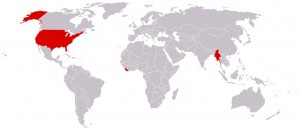Yes, no, and po
I like to make fun of people who don’t use the metric system.

It seems so much more efficient and structured, and with good reason. It’s a designed system, easier to work with that a system largely comprised of dimensions based on the human body—feet and inches and so on.
But then I started to ask myself, “why do we use decimal?” That’s an artifact of human bodies too. Binary would be much better, right? Maybe I'm being just as human-centric as people who cling to the size of a the finger of a ruler they claimed to have overthrown centuries ago.
The seldom-shy Sam Johnston jumped in to correct me. In response to my claim that binary made sense because it’s how the universe works—yes and no, true and false, purely, literally logical—Sam quickly reminded me that light has three settings. In addition to being off (no light, or zero) it can also be polarized—something you’ve probably seen through 3D goggles.
(Next time you’re at a 3D movie, put one goggle lens across another. If they’re oppositely polarized, you won’t see anything. It's cool.)
This means light can have three settings. Light works in base 3. Maybe the universe is base 3.
As it turns out, someone actually built a ternary computer, based on these ideas, and as we think about building a generation of computers that use light instead of electricity, they might be useful.

By storing three values per trit (instead of two values per bit) these machines can handle positive and negative values (-1, 0, and 1) better. And that's good for several reasons, not the least of which is that rounding up and down can be done without approximation. Rounding is the same as truncation.
Wacky? Apparently not. The great Donald Knuth suspected that we’d see a resurgence of Ternary computers because of their elegance.
Three values instead of two made me think of Edward De Bono, the psychologist and educator who coined the term “lateral thinking.” De Bono’s biography reads like he’s the charity arm of the Illuminati. A prolific author, he spends much of his time making up new words and proposing alternate solutions to seemingly intractable problems like conflict in the Middle East or tie-breaking football games.
In one of his books, he suggests we have three possible answers to a question: yes, no, and “po.”
No is skepticism, prove-it-to-me. Science assumes nothing unless proven; but it’s hard-pressed to make leaps of faith and try things that don’t make sense at first blush.
Yes is belief, I-don’t-need-evidence. Faith assumes everything unless disproven; but it’s hard to make objective decisions based on subjective belief.
De Bono says there’s a third way. Po is possibility, the creative process. Creativity says, “what if this were the case?” without assuming it is so.
Po is what René Descartes called “withholding assent.” It means not eliminating something just yet so that speculation can continue unabated. Anyone who’s ever brainstormed ideas knows that the first step is to create ideas without immediately dismissing them.
There’s no genius without a mixture of madness, as the saying goes, and recent research confirms this. A look at the psychology—and brain chemistry—behind creativity shows that there are two dimensions that researchers consider.
Intellect is what we think of as “brainy”: logic, reasoning, and deduction. Skeptical thinking and the need to prove things.
On the other hand, creativity is what we think of as “zany”: leaps of insight, perceiving patterns, and induction. Researchers call this "openness."
As I read through this research, I tried to envision the kinds of people who would score well one one dimension or another. Here’s what I wound up sketching on a scrap of paper.

That's a pretty dense graph. Basically, it says that:
Openness without intellect leads to seeing false correlations, belief without proof, relying on consensus, and high subjectivity—the stuff of faith healers and alternative medicine and astrologers.
Intellect without openness leads to an inability to consider new ideas and to speculate, or to put oneself in others' shoes—the stuff of psychopaths, cold-hearted financiers, and opaque scientists.
The right balance is De Bono's "po", a blend of intellect and openness that leads to true genius.
Fortunately, there's something we can do to strike the right balance. If we're unfeeling intellectuals, we need to ask ourselves the following kinds of questions:
Consider the possibility that...
What else could this mean?
How could others perceive it?
What does this remind you of?
On the other hand, if we're easy-believers who spend too much time craving simple truthiness over provable reality, we need to ask:
Can you prove it?
What is causing this?
How could someone else verify it?
What are the rules of this system?
De Bono's "Po", the balanced middle ground of a ternary system, is the third state. It's the one we hope elected officials will embody. It's the one that inspires and improves in tangible ways that still feel somehow decent and wholesome. And it's the attitude that tomorrow's leaders need to adopt to deal with a data-rich world where answers are easy but finding the right question is hard.


